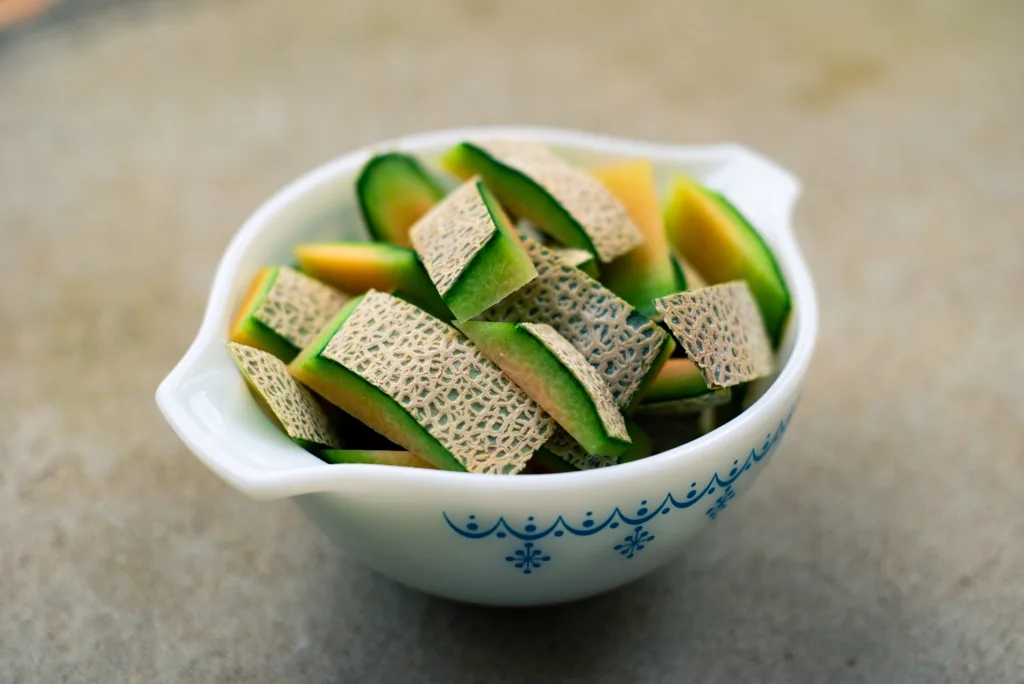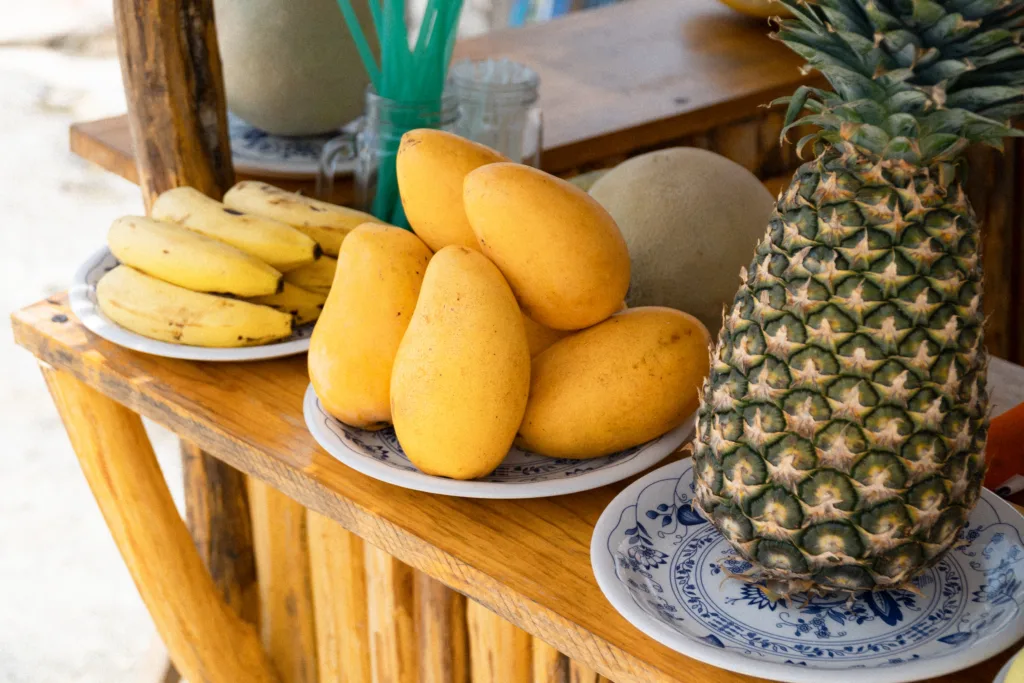Cantaloupe is a delicious, juicy fruit that is very popular all over the world. It’s a great source of vitamin A, which gives it its bright orange color. But how much sugar does it contain?
First, let’s take a look at the sugar content of a cup of cantaloupe. According to the USDA, one cup of diced cantaloupe contains 12.7 grams of sugar. This may seem like a lot, but when compared to oher sweet treats like soda, it’s a much healthier option.
In fact, cantaloupe has a low glycemic load score of 4. This means that it’s a great choice for people with diabetes, as it won’t cause a sudden spike in blood sugar levels. The high liquid content of cantaloupe also means that it’s a hydrating snack that can help you feel fuller for longer.
But what about other fruits? Are there any that are even lower in sugar than cantaloupe?
There are several fruits that are even lower in sugar than cantaloupe. Some examples include strawberries, which are high in fiber and contain very little sugar, and honeydew melon, which has a similar taste and texture to cantaloupe but with even less sugar.
On the other hand, there are some fruits that are higher in sugar than cantaloupe. Pomegranates, for example, contain nearly 24 grams of sugar per cup, while mangoes and bananas both contain around 23 grams of sugar per cup.
So, while cantaloupe may not be the absolute lowest in sugar when it comes to fruit, it’s still a great choice for a healthy and hydrating snack. As with any food, it’s important to enjoy it in moderation as part of a balanced diet.
The Sugar Content of Cantaloupe
Cantaloupe is a type of melon that is known for its sweet and juicy flesh. One common concern that people have about this fruit is its sugar content. So, is cantaloupe high in sugar?
The answer is that, compared to other fruits and sugary beverages, cantaloupe is relatively low in sugar. According to the United States Department of Agriculture (USDA), a one-cup serving of diced cantaloupe contains about 12.7 grams of sugar. This is slightly higher than some other fruits, such as strawberries (which contain about 7 grams of sugar per cup) and raspberries (which contain about 5 grams of sugar per cup).
However, it’s important to note that the sugar in cantaloupe is natural sugar, which is different from the added sugars found in many processed foods and beverages. Natural sugar is found in whole foods like fruit, and it comes packaged with beneficial nutrients like vitamins, minerals, and fiber. In fact, cantaloupe is an excellent source of vitamin A, providing over 100% of the daily value in a one-cup serving.
Compared to sugary beverages like soda, cantaloupe is a much healthier choice. A 12-ounce can of soda typically contains around 40 grams of added sugar, which is more than three times the amount of sugar in a cup of cantaloupe. Plus, soda provides very little nutritional value, whereas cantaloupe is a nutrient-dense food that can help support overall health and wellbeing.
To summarize, while cantaloupe does contain some sugar, it is relatively low in sugar compared to other fruits and sugary beverages. Plus, the natural sugar in cantaloupe comes packaged with important nutrients like vitamin A. So, if you’re looing for a sweet and healthy snack, cantaloupe is a great choice.

The Benefits of Eating Cantaloupe for Diabetics
Cantaloupe is a delicious and nutritious fruit that can be a great addition to a diabetic’s diet. With its low glycemic load score of 4, cantaloupe is a great option for people with diabetes. The glycemic load score measures how quickly a particular food is broken down by the body and how much it raises blood sugar levels. The lower the glycemic load score, the slower the food is digested and the less it affects blood sugar levels.
Cantaloupe is also a good source of fiber, which can help regulate blood sugar levels and improve insulin sensitivity. One cup of diced cantaloupe contains about 1.5 grams of fiber, which is about 6% of the daily recommended intake.
In addition to its low glycemic load score and fiber content, cantaloupe is also rich in vitamins and minerals that are important for oerall health. One cup of diced cantaloupe contains about 100% of the daily recommended intake of vitamin C, which can help boost the immune system and promote healthy skin. It also contains vitamin A, potassium, and other important nutrients.
When incorporating cantaloupe into a diabetic diet, it is important to keep portion sizes in mind. While cantaloupe is a healthy fruit, it still contains natural sugars that can raise blood sugar levels if consumed in excess. A serving size of cantaloupe is about one cup, or roughly 150 grams.
Cantaloupe can be a healthy and delicious addition to a diabetic’s diet. Its low glycemic load score, fiber content, and nutrient profile make it a great choice for people with diabetes who are looking for healthy and tasty foods to incorporate into their diet.
Fruit With The Lowest Amount of Sugar
If you are seeking a fruit that is low in sugar, there are several options available. Strawberries, for instance, are a popular choice among people looking for low-sugar fruits. They are high in fiber and contain very little sugar. Peaches are another option, as they are low in carbohydrates and have a low glycemic index. Blackberries are also a great choice, as they are packed with antioxidants and fiber, and have a very low sugar content.
When it comes to citrus fruits, lemons and limes are known for their low sugar levels. They are both great sources of vitamin C and can be used in a variety of dishes and beverages. Honeydew melon is another fruit that is low in sugar, with a mild flavor that pairs well with other fruits and vegetables.
Oranges and grapefruit are also relatively low in sugar, tough they do contain more than some of the other fruits on this list. However, they are both excellent sources of vitamin C and other nutrients. avocados are a fruit that is very low in sugar and high in healthy fats, making them a great addition to any diet.
If you are looking for a low-sugar fruit, there are several options available, including strawberries, peaches, blackberries, lemons, limes, honeydew melon, oranges, grapefruit, and avocados. Incorporating these fruits into your diet can provide a range of health benefits while helping to keep your sugar intake in check.
Fruits With The Highest Sugar Content
When it comes to fruits, some are higher in sugar than others. If you’re trying to watch your sugar intake or manage your blood sugar levels, it’s important to be aware of whch fruits have the highest sugar content. Here are the top five fruits with the highest sugar content:
1. Pomegranate: Pomegranates are known for their tart flavor, but they also have a high sugar content. One cup of the juicy kernels contains nearly 24 grams of sugar.
2. Mango: Mangoes are a delicious tropical fruit that packs a sweet punch. One cup of mango contains about 23 grams of sugar, but it also provides two-thirds of your daily needs for vitamin C.
3. Cherries: Cherries are a popular summer fruit that are often used in desserts. One cup of cherries contains about 18 grams of sugar.
4. Banana: Bananas are a common fruit that are high in sugar. One medium-sized banana contains about 14 grams of sugar.
5. Oranges: Oranges are a citrus fruit that are high in vitamin C, but they also contain a fair amount of sugar. One medium-sized orange contains about 12 grams of sugar.
It’s important to note that while these fruits may be high in sugar, they also contain important nutrients like vitamins, minerals, and fiber. If you’re watching your sugar intake, it’s best to enjoy these fruits in moderation and pair them with other healthy foods like nuts or seeds to balance out your blood sugar levels.

Conclusion
Cantaloupe is a delicious and nutritious fruit that is low in sugar and high in important vitamins and minerals. Its high liquid content also gives it a low glycemic load score, making it a great choice for people with diabetes or anyone looking to maintain stable blood sugar levels. Compared to other fruits that may be high in sugar, cantaloupe stands out as a healthy and satisfying option. So next time you’re looking for a sweet and refreshing snack, consider reaching for a juicy slice of cantaloupe. Your body will thank you for it!
